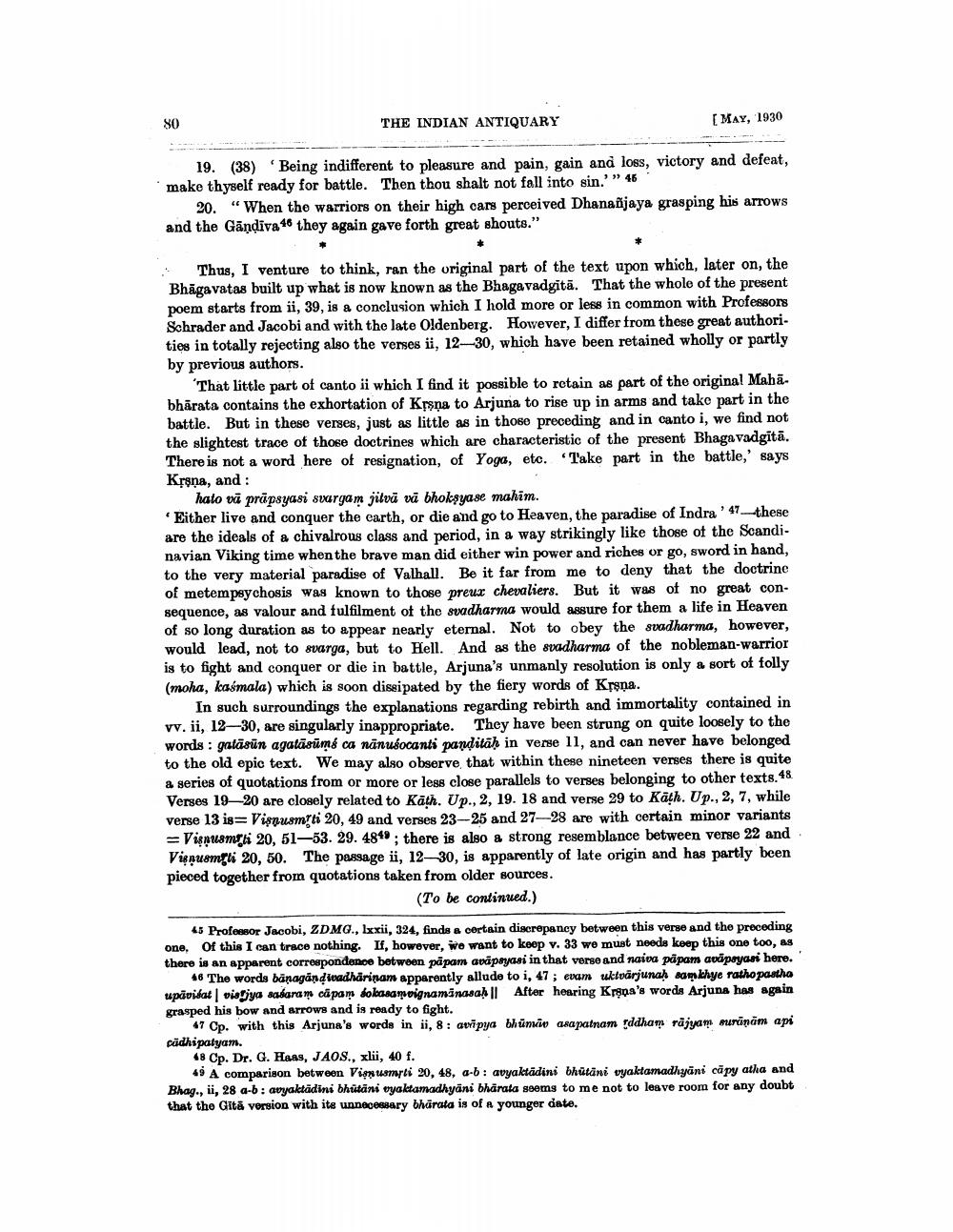________________
THE INDIAN ANTIQUARY
[MAY, 1930
19. (38) Being indifferent to pleasure and pain, gain and loss, victory and defeat, make thyself ready for battle. Then thou shalt not fall into sin.'" 46
20. "When the warriors on their high cars perceived Dhananjaya grasping his arrows and the Gandiva 46 they again gave forth great shouts."
Thus, I venture to think, ran the original part of the text upon which, later on, the Bhāgavatas built up what is now known as the Bhagavadgitā. That the whole of the present poem starts from ü, 39, is a conclusion which I hold more or less in common with Professors Schrader and Jacobi and with the late Oldenberg. However, I differ from these great authorities in totally rejecting also the verses ii, 12-30, which have been retained wholly or partly by previous authors.
'That little part of canto ii which I find it possible to retain as part of the original Mahā. bhārata contains the exhortation of Krsna to Arjuna to rise up in arms and take part in the battle. But in these verses, just as little as in those preceding and in canto i, we find not the slightest trace of those doctrines which are characteristic of the present Bhagavadgitā.
There is not a word here of resignation, of Yoga, etc. 'Take part in the battle,' says Krsna, and :
hato vi prūpsyasi swargam jitvā vi bhoksyase mahim. Either live and conquer the carth, or die and go to Heaven, the paradise of Indra'47_these are the ideals of a chivalrous class and period, in a way strikingly like those of the Scandinavian Viking time when the brave man did either win power and riches or go, sword in hand, to the very material paradise of Valhall. Be it far from me to deny that the doctrine of metempsychosis was known to those preux chevaliers. But it was of no great consequence, as valour and fulfilment of the svadharma would assure for them a life in Heaven of so long duration as to appear nearly eternal. Not to obey the svadharma, however, would lead, not to svarga, but to Hell. And as the svadharma of the nobleman-warrior is to fight and conquer or die in battle, Arjuna's unmanly resolution is only a sort of folly (moha, kasmala) which is soon dissipated by the fiery words of Krena.
In such surroundings the explanations regarding rebirth and immortality contained in vv. ii, 12–30, are singularly inappropriate. They have been strung on quite loosely to the words: gatāsün agatāsūms ca nānusocanti panditäh in verse 11, and can never have belonged to the old epic text. We may also observe that within these nineteen verses there is quite a series of quotations from or more or less close parallels to verses belonging to other texts. 48 Verses 19-20 are closely related to Kath. Up., 2, 19. 18 and verse 29 to Kath. Up., 2, 7, while verse 13 is= Vişnusmrti 20, 49 and verses 23-25 and 27-28 are with certain minor variants -Vişnusmrti 20, 51–53. 29. 4849; there is also a strong resemblance between verse 22 and Vişnusmfli 20, 50. The passage ü, 12—30, is apparently of late origin and has partly been pieced together from quotations taken from older sources.
(To be continued.)
45 Profesor Jacobi, ZDMG., lxxii, 324, finds a certain discrepancy between this verse and the preceding one. Of this I can trace nothing. If, however, we want to keep v. 33 we must needs keep this one too, as there is an apparent correspondence between papam avapoyasi in that verse and naiva papam avapoyasi here.
46 The words bänagåndtvadharinam apparently allude to i, 47 ; euam uktvarjunah samkhye rathopaatha upāvidat viatjya sasaran cupam dokasamvignaminasah || After hearing Kropa's words Arjuna has again grasped his bow and arrows and is ready to fight.
47 Cp. with this Arjuna's words in ii, 8: arīpya bhumir asapatnam ddham rajyam surūnām api cadki patyam.
18 Cp. Dr. G. Haas, JAOS., xlii, 40 f.
49 A comparison between Vin smrti 20, 48, a-b: avyaktadins bhutano vyaktamadhyāns capy atha and Bhag., ii, 28 a-b: avyaktadini bhutani vyaktamadhyāni bharata seems to me not to leave room for any doubt that the Cita version with its unnecessary bharata is of a younger date.




